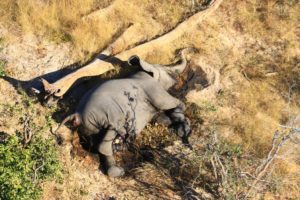
Microscopic Algae: Over 300 Elephants Die In Botswana Because Of Toxins Found In Water
The deaths of over 300 elephants in Botswana have been blamed on toxins that were found in the water that the animals were drinking from.
It was reported that toxins were made up of microscopic algae.
330 of the creatures died after ingesting cyanobacteria, which occurs naturally in standing water or watering holes.
Earlier this year, the mass death of the animals puzzled researchers and wildlife experts as over 300 carcasses of the animals were found in the Okavango Delta area of the country from the months of May and June.
It was initially feared that poachers could be the ones that were responsible behind the deaths of the animals, but experts wanted to make sure that was not the case.
Cyril Taolo, the Deputy Director of the Department of Wildlife and National Parks, ruled out poaching at a press conference on September 21, 2020.
He also said that carcass, soil, and water tests were being carried out. They also said that dead elephants still had their trunks, which means it was not poaching.
In a press release, he said:
I don’t think anybody can ever say never, but in this instance, the available evidence is showing that this was a natural occurrence.
Keith Lindsay, a conservation biologist, was in an interview with CNN about the deaths of the animals an the possibility of the thing that had killed them.
Keith said:
If it’s in waterholes or was in waterholes, why was it only elephants that were affected? The one thing elephants do that other species don’t is they go and seek crops in farmers’ fields. If farmers put out poison, elephants of all ages would get that toxin and then they would go back to their waterholes. That is at least, if not more likely than this cyanobacteria as cause of death.
Dr. Niall McCann, the director of conservation at UK-based charity National Park Rescue, said that the detection of cyanobacteria does not equate to proof that it was the cause of the elephants.
During an interview with The Guardian, Dr. Niall McCann said:
I hope that what the government has said is true because it rules out some of the more sinister things. Just because cyanobacteria were found in the water that does not prove that the elephants died from exposure to those toxins. Without good samples from dead elephants, all hypotheses are just that: hypotheses.
Mmadi Reuben, the Veterinary Officer at the Department of Wildlife and National Park, said that the exact cause of the elephant’s deaths still remain unsolved.
Botswana is home to 130,000 African elephants, which are classified as vulnerable.
They are listed on the International Union for Conservation of Nature’s (IUCN) Red List.